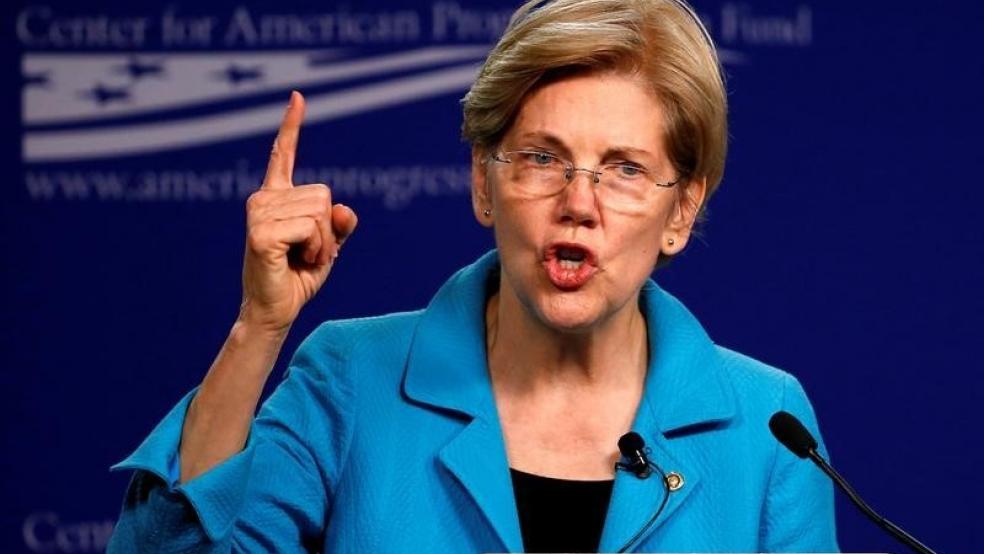Democratic presidential hopeful Sen. Elizabeth Warren (MA) plans to propose a new wealth tax on the very rich, The Washington Post reported Thursday. The Post’s Jeff Stein and Christopher Ingraham said the proposal comes as “Democratic leaders vie for increasingly aggressive solutions to the nation’s soaring wealth inequality.”
Earlier this month, Rep. Alexandria Ocasio-Cortez (D-NY) called for a 70 percent marginal tax on incomes over $10 million, inspiring a wave of debate and criticism (including a report this week from CNBC saying that “the super rich at Davos are scared of Alexandria Ocasio-Cortez's proposal to hike taxes on the wealthy.”) But progressive groups say that an income tax, no matter how high, will do little to reduce the soaring wealth inequality experienced in the U.S. over the last few decades.
Differences in wealth are far more pronounced than differences in income, they say, with the top 20 percent of households claiming about 60 percent of the income but nearly 90 percent of the wealth. To reduce that inequality, and to raise money to pay for an ambitious policy agenda that includes universal health care and a federal response to global warming, progressive groups are increasingly turning to a wealth tax. Here’s a quick review of four wealth tax proposals released this week:
• Sen. Elizabeth Warren (D-MA) will reportedly call for an annual 2 percent tax on Americans worth more than $50 million, and a 3 percent tax on those with more than $1 billion. Economist Emmanuel Saez, who has been advising Warren, said that the tax would apply to about 75,000 families in the U.S., or less than 0.1 percent of households, and raise $2.75 trillion over 10 years. According to the Post Warren will also propose increased funding for the IRS; a mandatory audit rate for the wealthy; and a penalty for those who renounce their citizenship.
• The Institute on Taxation and Economic Policy proposes a 1 percent annual tax on the richest 0.1 percent of Americans, which ITEP’s Steve Wamhoff says would include those worth $32.2 million and higher in 2020, or about 175,000 families. Such a tax is projected to raise about $1.3 trillion over 10 years. Wamoff says that while the IRS has experience evaluating great wealth as it imposes the estate tax, the agency will need to become far more efficient as it tackles the valuations of the many assets held by the very rich, including illiquid business assets, real estate and trusts. Accordingly, ITEP proposes to increase funding for the IRS — an increase Wamhoff says would more than pay for itself in the first year.
• The Washington Center for Equitable Growth says that the richest 1 percent of families in the U.S. is worth about $33 trillion, while the top 5 percent is worth about $57 trillion. Greg Leiserson, WCEG’s director of tax policy, doesn’t discuss a specific tax rate, but says that given the existing levels of wealth, the “revenue potential of a net worth tax in the United States is large.”
• Oxfam International released a study earlier this week, “Public Good or Private Wealth,” that calls for a global tax on wealth. The British non-profit says the ultra-rich have grown richer as the economy has boomed and tax rates have fallen, with just 23 billionaires now owning as much wealth as the 3.8 billion people in the bottom 50 percent of the world population. While the analysis is light on specific policy proposals, it does say that, “Getting the richest one percent to pay just 0.5 percent extra tax on their wealth could raise more money than it would cost to educate the 262 million children out of school and provide healthcare that would save the lives of 3.3 million people.”
What people are saying: Many questions remain about a wealth tax, not least its constitutionality, and the politics of it are tricky at best. But the proposals are generating a good deal of discussion and debate. Here’s a sample of comments:
• The right-leaning Tax Foundation responded to Warren’s plan by saying: “There are two main reasons a tax like this would be a bad idea:
1. It would be difficult to administer
2. It would be a poorly designed tax on capital.”
• Scott Greenberg, a tax expert formerly with the Tax Foundation, tweeted, “The fact that two important progressive organizations in the tax space are hyping wealth taxation makes me think that this is an issue we're going to hear more about, possibly in the Dem primary.”
• Economist Stephanie Kelton, who advised Sen. Bernie Sanders (I-VT) during his presidential run in 2016, tweeted: “As the wealth tax proposal gains momentum--I predict it will--it'll be interesting to see how those advocating it frame the case. Which gets emphasized? Revenue or Inequality?” Kelton also wrote, “How much wealth should a wealth tax tax if a wealth tax should tax wealth? I see this getting a lot of play in the weeks and months ahead.”
• NYU law professor David Kamin wrote: “Bottom line: Warren proposal is addressed at a real problem of inequality and ineffective taxation at the very top, and goes big as it should. Hope this is the start of a real debate about the contours of fundamental and progressive tax reform.”
• Bloomberg’s Noah Smith said: “Why wealth tax is better than super-high-bracket income tax:
1. It is much more broad-based, so will raise more revenue
2. It taxes past accumulated wealth instead of only future wealth
3. It targets the idle rich, whereas the income tax thing targets entrepreneurs.
For more details, see The Washington Post on Warren’s proposal; ITEP’s proposal here; WCEG’s policy analysis here; and Oxfam’s report here.




